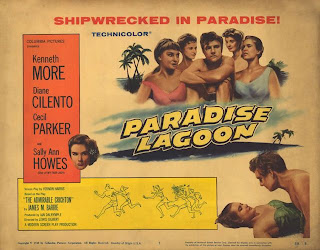AFED #58: The Admirable Crichton (UK, 1957); Dir. Lewis Gilbert
I didn't hold particularly high hopes for today's film, The Admirable Crichton (known in the US as Paradise Lagoon, lest the poster cause any confusion). It was an arbitrary late choice and seemed likely to be a stilted fifties comedy that hadn't aged well. It certainly belongs to a different era but proved surprisingly enjoyable.
An adaptation of J.M. Barrie's 1902 play, Kenneth More stars as Crichton, the resourceful butler with a impeccable sense of duty and his place in the social hierarchy. Whilst serving his master the Earl of Loam on board the Earl's luxury yacht in the Pacific, they are forced to abandon boat and become marooned on a desert island. It's swiftly evident that the Earl and his family haven't a clue how to cope for themselves and it's up to Crichton to take charge.
We jump forward two years and the social order has been completely reversed. Crichton is now the top dog and incontestable alpha male, what's more the Earl and the rest of the family seem to love the new status quo and life on the island has become an idyllic paradise. Naturally a boat then finally arrives to return them to reality, and Crichton modestly resumes his former standing.
As a subversive critique of the class system this definitely isn't The Servant, which a few years later would offer a far more dissolute portrayal of the relationship between the master and his underling. Yet even during the early Edwardian period of Barrie's original drama the cracks were beginning to show; the Earl attempts to demonstrate his liberal sensibilities by inviting his servants to tea and there are topical references to the suffragette movement. Crichton's island adventure might ultimately proves a fantastic lacuna and no threat to the natural order, but notwithstanding the laughs it must have seemed quite whimsical to a fifties audience who were watching that world disappear.
Kenneth More excels as the butler, as does the splendidly lordly Cecil Parker and Sally Ann Howes as the daughter who falls for Crichton's charms. The ending is admittedly somewhat anticlimactic and you do find yourself wishing it had dared to remain as silly as it becomes in the middle act. Yet in an oblique way it's hinting that men of Crichton's ilk will become the new ruling class while the aristocracy wither into obsolescence.
An adaptation of J.M. Barrie's 1902 play, Kenneth More stars as Crichton, the resourceful butler with a impeccable sense of duty and his place in the social hierarchy. Whilst serving his master the Earl of Loam on board the Earl's luxury yacht in the Pacific, they are forced to abandon boat and become marooned on a desert island. It's swiftly evident that the Earl and his family haven't a clue how to cope for themselves and it's up to Crichton to take charge.
We jump forward two years and the social order has been completely reversed. Crichton is now the top dog and incontestable alpha male, what's more the Earl and the rest of the family seem to love the new status quo and life on the island has become an idyllic paradise. Naturally a boat then finally arrives to return them to reality, and Crichton modestly resumes his former standing.
As a subversive critique of the class system this definitely isn't The Servant, which a few years later would offer a far more dissolute portrayal of the relationship between the master and his underling. Yet even during the early Edwardian period of Barrie's original drama the cracks were beginning to show; the Earl attempts to demonstrate his liberal sensibilities by inviting his servants to tea and there are topical references to the suffragette movement. Crichton's island adventure might ultimately proves a fantastic lacuna and no threat to the natural order, but notwithstanding the laughs it must have seemed quite whimsical to a fifties audience who were watching that world disappear.
Kenneth More excels as the butler, as does the splendidly lordly Cecil Parker and Sally Ann Howes as the daughter who falls for Crichton's charms. The ending is admittedly somewhat anticlimactic and you do find yourself wishing it had dared to remain as silly as it becomes in the middle act. Yet in an oblique way it's hinting that men of Crichton's ilk will become the new ruling class while the aristocracy wither into obsolescence.




Comments
Post a Comment